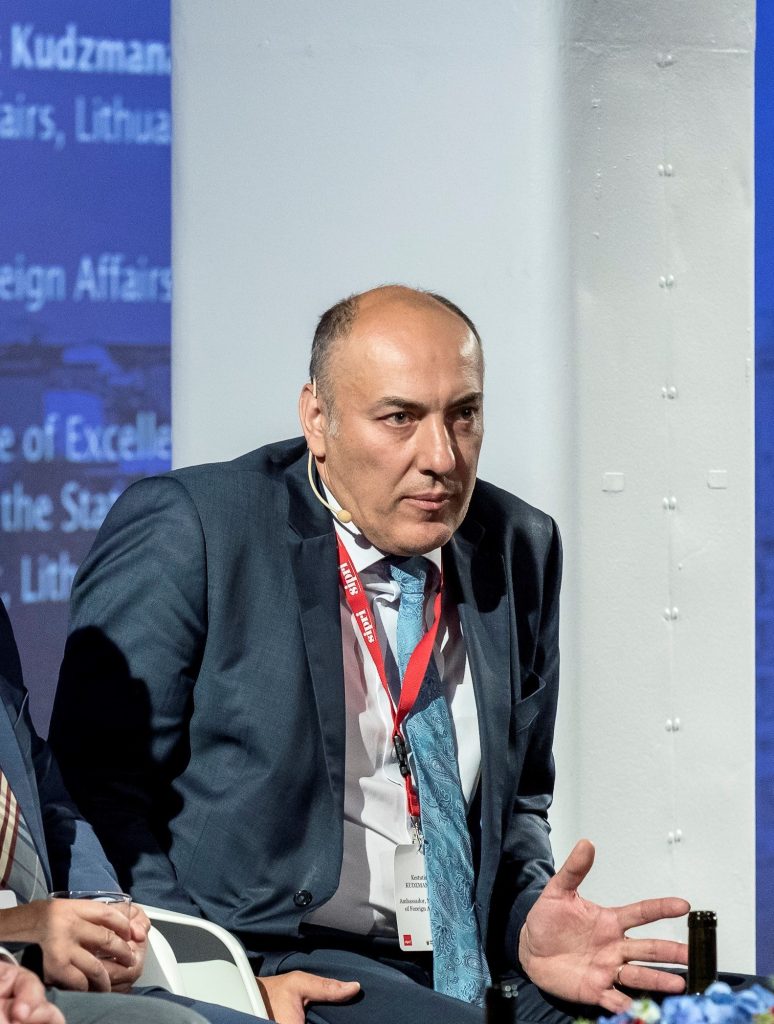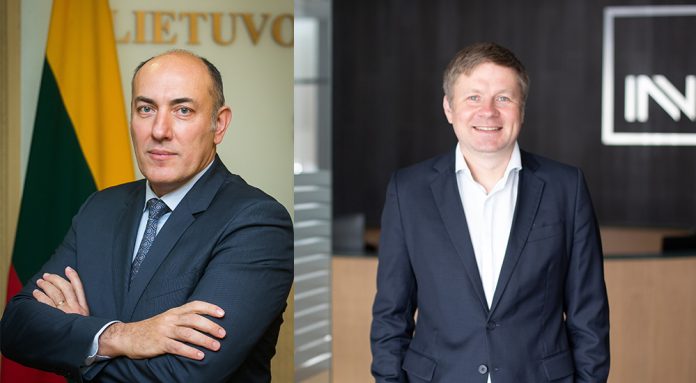The Republic of Moldova and the Republic of Lithuania have a similar historical past. Both were part of the former Union of Soviet Socialist Republics. Both have a population of less than three million people, but the difference in GDP per capita between the two states is considerable. In order to identify possible ways to develop the Republic of Moldova, I spoke with the Ambassador of Lithuania to the Republic of Moldova, Kęstutis Kudzmanas and with the representative of one of the largest lituanian companies present in our country – Vytautas Plunksnis, Director of Private Equity, Member of INVL Asset Management, Chairman of the Board maib. The goal was to identify elements that can be borrowed, so that we can improve Moldova both economically and socially.
As the First World War drew to a close, Lithuania signed its act of Independence on February 16, 1918, declaring the establishment of the sovereign state of Lithuania. Since 1940, Lithuania has been occupied first by the Soviet Union and then by Nazi Germany. Towards the end of World War II, in 1944, the Germans withdrew and the Soviet Union reoccupied Lithuania. On March 11, 1990, one year before the formal dissolution of the Soviet Union, Lithuania became the first Soviet republic to declare itself independent, leading to the restoration of the independent state of Lithuania.
The Ambassador of Lithuania to the Republic of Moldova, Kęstutis Kudzmanas
After Lithuania declared its independence, Moldova was the first state to recognize it, which is why we are grateful. The relations of cooperation between the Republic of Moldova and the Republic of Lithuania continue to this day and continue to develop, with Lithuania being open and ready to provide both technical assistance and to share the lessons it learned in the way of economic development.
After the declaration of independence from the USSR, it became clear that on our own we do not have the opportunity to compete with the big economies. We weren’t sure about the safety of our state either. Following numerous discussions and negotiations, two significant decisions were taken for Lithuania’s future at that time: accession to the European Union – a security element for economic development and accession to NATO – for peace. Identifying these development paths for a state is of major importance.
Lithuania received the necessary support at the beginning of the journey, and today it has become one of the countries providing technical assistance to countries at a lower stage of development.
Lithuania is one of the fastest growing EU economies and ranks 24th in the world in the Business Ease Index.
Lithuania remains a strong supporter of Moldova’s aspirations to become a member of the European family. We are ready to share our experience and provide the necessary technical assistance.
Lithuania’s support for Moldova is aimed at implementing the provisions of the EU-Moldova Association Agreement (AA / DCFTA), which entered into force on 1 July 2016, including its provisions on the Deep and Comprehensive Free Trade Area (DCFTA), strengthening reforms, and maintaining Moldova’s European integration aspirations.

Following the presidential elections of 11 November 2020 and the early parliamentary elections of 11 July 2021, Moldova has the favorable political circumstances to take advantage of the AA / DCFTA and accelerate the pro-European reforms. The progress towards EU should be made irreversible.
Lithuania is interested in keeping Moldova on the path of European development, accelerating reforms, strengthening EU support for the implementation of AA / DCFTA, increasing the visibility of EU added value for the population, supporting EU transition (sectoral integration and integration into the EU internal market).
Another key issue is the active support and sharing of experience, especially in the public sector, in the implementation of political, economic and social reforms and in the strengthening of the democratic development of the society. Some of the methods include using the support mechanisms of international donors, transferring the expertise of Lithuania – operating models and innovative solutions for implementing reforms in the Republic of Moldova, promoting bilateral cooperation between Lithuanian and Moldovan institutions, identifying specific needs in each sector, as well as sending Lithuanian experts to Moldovan institutions for training.
We provide training to Moldovan institutions on how to use multilateral instruments, e.g. E5P Fund (Eastern Europe Energy Efficiency and Environment Partnership), which implements important infrastructure and environment projects.
Lithuania’s strategic objectives for development cooperation are based on the needs of the Republic of Moldova, the Program of the Government of the Republic of Lithuania and the priorities of the EU’s Neighborhood Policy.
Lithuania is actively involved in EU twinning projects in Moldova.
Between 2010–2021, Lithuanian institutions won 12 project selections in the fields of corporate governance and risk management in the financial sector (2021 together with RO/NL), food safety (2020 together with AT/PL), the efficiency of vocational training (2018, Together with Fi/EE), combating money laundering and anti-corruption (2018 together with PL/DE; 2017 RO/Fi), Modernization of Police and Customs (2018 with PL; 2017 with IT), medical and pharmaceutical system (2016 with PL), Food safety (2016 together with LV/SE), modernization of the public service system (2014 LT), consolidation of the veterinary system (2010 with the United Kingdom) and Consumer Protection (2010 with the United Kingdom).
Between 2006 and 2021, the Ministry of Foreign Affairs of Lithuania funded the implementation of 144 projects in Moldova, with a total budget of over 1.1 million euros.
This year, 350,000 euros are budgeted to Moldova to strengthen the institutional capacity to support reform efforts in Moldova.
This is how the European Union works: you receive support at the beginning, and when you are prepared – provide support to other states. The support that Lithuania benefited from the European Union, has always been greater than the one it offered.
Lithuania’s government took a number of decisions regarding humanitarian aid not only for Ukraine but also for Moldova. Lithuania has already contributed 750 000 EUR to the budget of Moldova, in order to support the Government’s efforts to deal with the flow of refugees from Ukraine. The donor community and the Moldovan government recognize that financial assistance is one of the most effective ways to help Moldova in the current situation.
Lithuania is also ready to accept 2 000 refugees from Ukraine who are currently in Moldova. The first two buses with Ukrainian refugees from Chisinau have already left for Lithuania (over 200 refugees). I would like to underline excellent cooperation with Moldovan Migration and Asylum Office in organizing the transport of refugees to Lithuania.
Earlier, on 14 May 2020, Lithuanian-made protective equipment required to combat COVID-19 was delivered to Moldova, Armenia, and Georgia. 10 500 face shields from Lithuania for medical workers have been donated to Moldova. The face shields for medical staff were made in Lithuania. Two deliveries of 11 000 and 26 500 doses of Vaxzervria vaccine were donated to Moldova from Lithuania.
Moldova became the first country in the European region to receive COVID-19 vaccine from the COVAX initiative. The European team, which brings together the EU and its Member States, is one of the main sponsors of COVAX, contributing more than € 2.2 billion euros. Lithuania is also participating in COVAX.
Vytautas Plunksnis, Director of Private Equity, Member of INVL Asset Management, Chairman of the MAIB Board
Accession to the European Union has really meant rapid economic growth for Lithuania. However, there are lessons learned that we have not heard of before joining and that others should not repeat.
EU accession has had a very strong impact on the expectations of businesses, citizens and even economic decision-makers. In the first three years after accession, the euphoria warmed the indicators of the Lithuanian economy: not only GDP, wages, exports, but also debt grew rapidly.
Excessive optimism and inexperience, as well as a lack of insurance, have led to a crisis: a public sector with empty pockets, bubbles in the real estate markets and the credit market. The Great Recession of 2009 painfully taught us a number of lessons. The most important of these is that a reputable integration shield will not help a small open economy if it pursues its own economic policies unsustainably, does not fight corruption and the bureaucratic system, does not invest in human resources and lets the brain drain happen.

After Lithuania learned this lesson and painfully regained its competitiveness (by cutting salaries and pensions), the Lithuanian economy recovered and successfully continued its rapid development.
Lithuania managed to keep the network of companies inherited from the Soviet era. What failed – was to prepare all companies in front of thousands of other European competitors. With the opening of access to a market of 433 million, you enter a market where competition is directly proportional. In such moments, it is not only the quality and the right prices that save you. In an international market you also need an international name. Lithuanians have been given access to world-famous Italian, French and German products. At the same time, Lithuanian companies were not internationally known at the time. Those who adapted a little, resisted.
That would be an extremely important lesson. Invest now in names, networks, markets. Joining the European Union will boost your development. If you focus only on the internal market, with access to the European market, the local market may decline in value.
Favorable starting positions and significant competitive advantages of labor costs have led to an increase in exports and a change in the structure of exports. Lithuanian business took advantage of the favorable geographical situation and assumed the role of re-export and transport corridor between East and West, while exporters of goods of Lithuanian origin established themselves in Western markets.
Prior to joining the EU, the role of the Russian market in the structure of Lithuanian exports had weakened. It accounted for 9.3% of all Lithuanian exports (including re-exported goods).
Only in terms of exports of goods of Lithuanian origin, Russia’s role is small: this market accounted for an average of 5% before the Russian embargo, and in recent years – the share of Lithuanian exports to the Russian Federation market is only 1.7%.
Two thirds of all goods of Lithuanian origin are exported to EU markets.
EU membership has caused initially direct damage to the Lithuanian population and labor market, which I mentioned earlier. Since 2004, 637,000 people have gone abroad to work, study or live. However, this event has given Lithuania an impetus to change – as labor resources dwindle and become more expensive, we are gradually moving from a cheap labor state to a country that creates more added value. Opportunities created by EU membership in the field of education also serve this purpose, including Erasmus programs and easier access to qualifications in other EU countries.
Lithuania’s structural changes are also accelerated by attracting foreign capital: with future investments in the country, we take on knowledge, staff, technology, advanced management practices and so on.
As an EU member, Lithuania, like any other EU state, must coordinate its economic policy with the European Commission and pursue not only national but also regional objectives.
Lithuania, like other members, has strategic objectives for the EU (for example, to contribute to the implementation of the Green Course by promoting internal transformation in the areas of public sector, science and innovation, digitalization and a healthier energy balance).
Personally, I fell in love with Moldova. It just so happens that I spend a lot of time here.
INVL – Invalda is a group of companies from Lithuania, with an activity closely related to the Moldovan economy. Invalda INVL, the first privately held company in Lithuania, started in 1991 with INVL Asset Management. At the end of 2021, it had over 250,000 customers in 7 European countries. These are clients who have entrusted companies in the INVL Asset Management group with the management of their assets.
INVL Asset Management is one of the greatest shareholders of the Commercial Bank MAIB. We were invited to the Partnership by the EBRD. I had previous work experience with a Lithuanian bank. Although the first meeting took place in 2016, in 2018 we have already invested in MAIB. Investments of this extent are not made in one day. I worked on the project for two years. Finally, a consortium was created, which now holds 41% of the share capital of MAIB. The Invalda structures own, in turn, 37.5% in this consortium.
We are major shareholders, but not the majority. Our goals are the same as those of the other shareholders. The main objective is the development of the bank and satisfying the needs of its customers. If the customers are satisfied, the bank’s team will thrive, and we, as shareholders, will be happy.
In some way, the company has a direct interest in the economic development of the Republic of Moldova, we can say.
When you ask me about how foreign investors can be attracted – the answer is certain: stable economy, correct public system, no corruption and bright minds. Moldova should also change the strengths for attracting investors from “cheap labor”, in “qualified workforce”. This is done through investments in education and combating corruption, and foreign companies, including INVL Group, will orient their investments to this small country with a big heart.
For the most important news, subscribe to our TELEGRAM channel!


